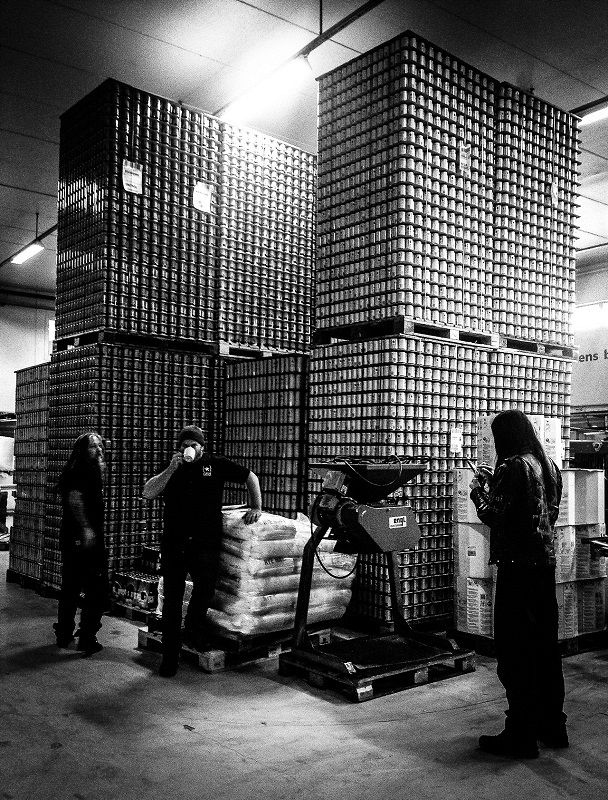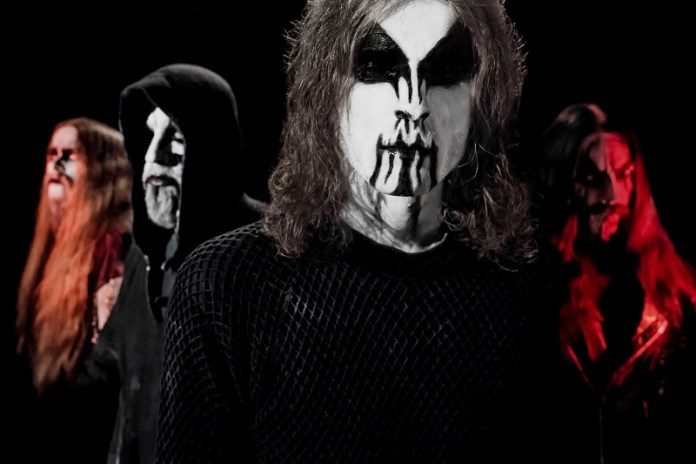As it has happened many times before, my love for black metal lead me to another seminal band of the genre: 1349.
Hailing from Norway, this is a band that has made a permanent mark in the darkened metal landscape by releasing nothing but powerful and relentless music for over 20 years.
I spent quite a bit of time with Seidemann, bass player and founding member of 1349, who was kind enough to open the doors to the dark world of the band… as well as to share some very appreciated insight on beer.
We’ll never move away from black metal, because we ARE black metal!
MB: First off I’d like to thank you for taking the time to chat with us in this very hot Hellfest afternoon.
Seidemann: Yes, my pleasure.
MB: I really enjoyed the sound of “Slaves,” the first single of your upcoming Massive Cauldron of Chaos album. What can you tell us about this new release?
Seidemann: It’s 1349 at our best. We have taken everything from before, refined it and built it up; we took all the influences we could and put them together. We’ve always felt that if we can’t do a better album than our previous one, then we shouldn’t release a new one at all. This is why it has taken us 4 years, which is quite a lot of time, to get this done, but we’ve been touring, writing, and selecting the right material for it. Massive Cauldron of Chaos represents where we want to go now, we didn’t want to just do a new Demonoir, since we always want to move up, and get better.
MB: When you compare the material in Demonoir to Massive Cauldron of Chaos, I felt that the latter is a bit flashier than your older material. Are you maybe trying to move away from the traditional black metal sound?
Seidemann: No! We’ll never move away from black metal, because we ARE black metal! 1349 is black metal, no ifs, ands, or buts about it! What we do will always be black metal; however, we can’t just redo the same thing over and over, we have to move on. The new material is a bit broader, there are more influences, it has some thrash vibes (as it’s obvious from “Slaves”, which has very obvious thrash influences), especially stuff like old Atheist, Bay Area thrash like Exodus and, of course, Kreator and Sodom. We have all of those in there.
MB: It’s interesting you say 1349 has been and will always be black metal. I agree completely, I think it’s one of the pivotal bands in black metal. I talked to Morgan Steinmeyer of Marduk, and he mentioned that you can ONLY call a band black metal if it deals with Satanism. Do you agree that without Satanism black metal wouldn’t exist?
Seidemann: It depends on where you consider black metal to have started. Let’s face it, Venom were a punk band who jokingly wrote lyrics about Satan, and yet for many people Venom are black metal. At the same time, Black Sabbath sings about Satan, but mostly from a Christian perspective; I mean, Christian bands sing about Satan also, but I don’t consider them to be black metal.
Satanism has many facets, and I believe that black metal should have an anti-religious, or darker side to it. However, the idea that unless you mention Satan in every lyric, it’s not black metal? That’s a very childish way of looking at it.
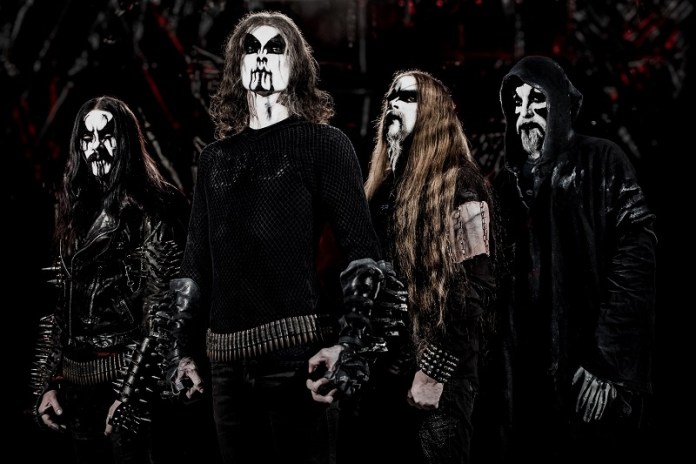
MB: I think what Morgan meant on this issue wasn’t so much that every song had to be about Satan, but rather that the music has to come from this dark place. So, for example, Immortal singing about dragons and winter, no matter if the vocals are shrieked and no matter how distorted the guitars are, would not be black metal.
Seidemann: It has to have that feeling from within, that’s black metal. It’s the same feeling I had as a kid when I listened to Burzum. That feeling, when it’s harnessed from the inside, is the “black metal feeling.”
MB: Speaking of Burzum, when Varg talks about it now he says that it was never Satanic, and that it was actually focused on Odinism or Paganism. How do you feel about this apparent change in views?
Seidemann: [chuckling] I don’t know Varg, I’ve never met the guy, and what he says now doesn’t really matter so much to me. Back then the music spoke to me in a certain way, and that’s all that matters. The last thing I heard from Burzum was Filosofem, and that resonated within me; when he did all the synth stuff, it really didn’t do anything for me, so I stopped listening. Whatever he clams now doesn’t really bother me, or even matter to me.
If we want to flip the coin, 1349 has in it’s history mentioned Satan in one song, since we’ve been mostly going about “chaos this, chaos that.” So if you want to have a very puritanical approach to it, then we are not Satanic. I don’t give a shit about Satan, I’m not a Christian! People, to a large degree fans more than the actual bands, are so happy to make up these interesting rules. Let’s look at the original bands, for instance. Mayhem does not sound like Emperor, does not sound like Darkthrone, and you get the idea. So you have to go “is there some common denominator here?” Yeah, they were all doing what they felt was black metal, and THAT is what makes it black metal.
MB: I have read some of the letters that Dead from Mayhem was writing at the beginning, and the motivation that existed in black metal at that time was to make something that scares everyone and to set it apart from other sounds. To go back to Varg Vikernes, for example, he chose very bad equipment and production at first because he wanted to make it hard to approach. This is interesting because your new album, for example, shows a very polished production. How important do you think it is for black metal to not be easy to approach, to never be easily digestable?
Seidemann: Well, here’s the thing, and I don’t think a lot of people realize this because they’re in the middle of it. Most of us that listen to black metal have become acquainted and accustomed to it. Most people don’t start out and say “Oh, I’m listening to Burzum, and this is the best thing!”
MB: Exactly; I remember when I first listened to black metal, and I said “What the fuck is that? I hate it!”
Seidemann: In the 80s I listened to regular heavy metal like everyone else. Then I discovered Celtic Frost, Hellhammer, Mercyful Fate and death metal, so I kind of made my way up to black metal, and black metal was the thing that clicked with something in me. So, when you’re into it, you say “ah, this sounds polished,” but you’re not a kid listening to radio pop. I can play our new songs to the kids at the youth club back home where I work, and I can guarantee to you that 95% of them would say “what is this fucking noise, it’s not even music!”
If we wanted to do 10,000 Liberation albums, we would have done that. Time changes, we change; true, the production on the new album is probably better in terms of quality than it was before but, you know what? It’s okay. I’m closing in on 40, and I’ve done black metal half my life. I’m not going to stop, but things are going to change, because I can’t say to myself “I want to sound like 1993,” because it’s not 1993!
MB: I didn’t mean “polished” as a negative thing! I’m not saying “you’re not true anymore! [laughs]
Seidemann: Oh no no.Fuck “true.” The concept of “true” doesn’t have any meaning for me.

MB: Do you think at some point it starts to become silly when people start to say “no that band is not kvlt, that band is not true?” There’s this crazy, silly elitism in the metal scene.
Seidemann: It’s ridiculous. We are slumming around in the outskirts of a sub-genre of a sub-genre. Even the biggest of the biggest black metal bands are tiny specks of dust on the foot of Metallica, and they in turn are a tiny speck of dust on the boot of U2. They’re never going to be a commercial success. If you want to be “trve” and “kvlt,” you can sit at home on the internet and listen to cassettes that you’ve recorded in your basement, never play to anyone else; but don’t try to tell me how to play my metal, because I do it the way I want to.
MB: It’s always a risk. People like to listen to metal, that like a certain band, but the minute their neighbors know the band, they’re like “oh, they sold out.” It happened with Watain. They’re fairly well known in black metal now, so it immediately means they sold out to some people.
Seidemann: That means the people having those thoughts are very childish, and need to adjust their attitudes. If you like a band it shouldn’t matter how many people do or don’t like them, you like the band because it speaks to you, or it speaks to me. I mean, I love Mayhem‘s De Mysteriis Dom Sathanas. I loved it back in 1994, I still love it now, and 90% of people that love black metal will say “I love De Mysteriis Dom Sathanas.” Does that make me love it any less? No, because it’s a fucking great album; grow the fuck up people!
I have to say this, because it’s been bothering me a long time: there’s enough mediocrity out there. There are shitloads of bands that believe that being true means sounding like a certain Darkthrone album; no, that’s being Darkthrone around that period. Grow the fuck up, stop with all the mediocrity! We don’t need a stale, dead scene of copycats. We don’t need another Darkthrone, there’s already a Darkthrone. Do something fresh, we don’t need mediocrity. The world floods us with it everywhere. Be passionate about it, give it your heart, your soul, all you’ve got, and then you can start worrying about if it’s true or not. If it’s true to you, then it is “true”. Take Dødheimsgard (a.k.a. DHG) for instance; they’re a band who have been getting a lot of “what the fuck are you doing?” lately; but they’re doing exactly what the mastermind behind that band wants to do, and it’s great stuff. That’s how you get progress.
MB: When you first started out as a band, to make an album was a very big deal, but nowadays anyone can make an album at home with their computer. Do you think this oversaturation of the market has damaged the overall quality?
Seidemann: Yes! It goes back to what I was talking about with mediocrity. Sure, everyone can make an album at home, which is nice, but that does not mean everyone SHOULD release an album. As I said, we’re flooded with mediocrity, flooded with stuff that’s “just okay”; but you know what? I don’t need okay. If I wanted just okay, I could just stop listening to metal and just listen to the radio, and then I’ll here “okay.” I want real shit!
MB: There was a lot of camaraderie at the beginning of black metal, with the so called “Inner Circle of Black Metal,” or “The True Norwegian Black Metal.” Do you think that can ever be replicated again, that the bands can feel united like that again?
Seidemann: The thing with the so-called “Inner Circle” was that they had very strict quality control. If there were bands playing stuff they didn’t really think was good enough, they would call them and say “stop playing, or we’ll fucking kill you!” Then Euronymous dies, the whole thing goes away, and then we’re flooded. I think that will never come back. It’s over 20 years ago now, 1993, and we shouldn’t really be striving to get 1993 back. We have to look forward, and I think the ones that are putting their hearts into what they are doing will stay, and will continue on. The ones that aren’t really in it will simmer down into mediocrity, and they’ll be stuck there.
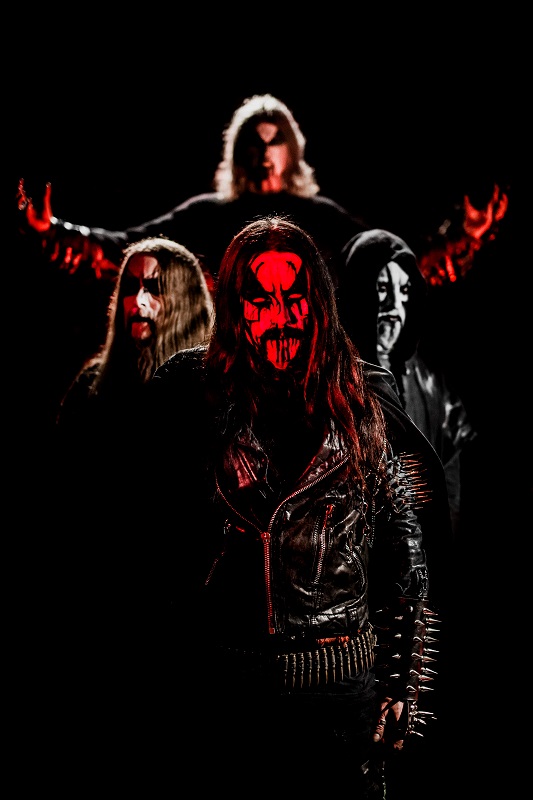
MB: You mentioned the death threats, and there was a lot of emphasis on the extra-curricular activities in the early scene. Do you think that in the long run, that aspect was beneficial or negative to black metal?
Seidemann: [Laughs] It depends. PR wise it was, of course, beneficial. Over the last 20 years the negative effects of all that shit have been toned down. People are not afraid of me in my hometown anymore [laughs]. Of course, I don’t have long black hair anymore. Back in 1993 I was 15, wearing black metal shirts, long black hair and all that shit. You do crazy shit when you’re 15, of course they were afraid of me, it was dangerous, but now it got accepted. It became easier to get gigs after a while, because people actually looked upon what you did as music instead of just noise. They saw musical value in what you did, and that’s beneficial.
MB: Dead wasn’t happy about black metal becoming accepted, he wrote about “mainstream skater kids” showing up. Do you think that it was bad for black metal that it eventually became accepted?
Seidemann: No; let’s face it, everything gets accepted. I think that as long as there are people with the spirit and the will to do something properly, then it will never be “truly” accepted, except by the metal people. We in the metal music industry tend to forget that the rest of the world is much larger than our little scene. Even though black metal became accepted as “mainstream” within metal, it will never truly be “mainstream”; it’s still part of the sub-genre of metal which people associate with screaming people and murders. It’s never going to be “big”; we’re still a bit off the beaten path. The nature of what we do makes certain that it will never go really big, because it is extreme, dark, and deals with matters that “normal” people don’t really know how to handle. It will never be “hey guys, listen to this new 1349 song on the radio!”; it’s not going to happen.
MB: There’s a little more acceptance within mainstream society. Watain won a Grammi in Sweden, for instance.
Seidemann: Ah, but I mean they won it in the Metal category, right? It’s not like at the Grammi’s they went “we have Justin Bieber, and some other famous people, but let’s give it to Watain.” It’s not like that, it’s more like “we have a bunch of bands here we don’t really know, but this band sounds best, let’s give it to them.” It’s still pretty low-key. As I said, we’re a fiercely competitive bunch in the metal business, and think the metal business is everything, when we’re really just a little fragment. This is sad, really, because the fact that everything is so competitive is what ultimately keeps black metal, and metal in general, down. It’s not a community, it’s a pissing contest, and the internet has made that a lot worse. Now people can safely tell you how they think your music should sound, over the internet.
MB: Right, you’ve never touched a guitar in your life, but on the internet you can suddenly say “you suck!”
Seidemann: Yeah. And that’s when, if you’re serious about your music, you stop giving a shit about what other people say.
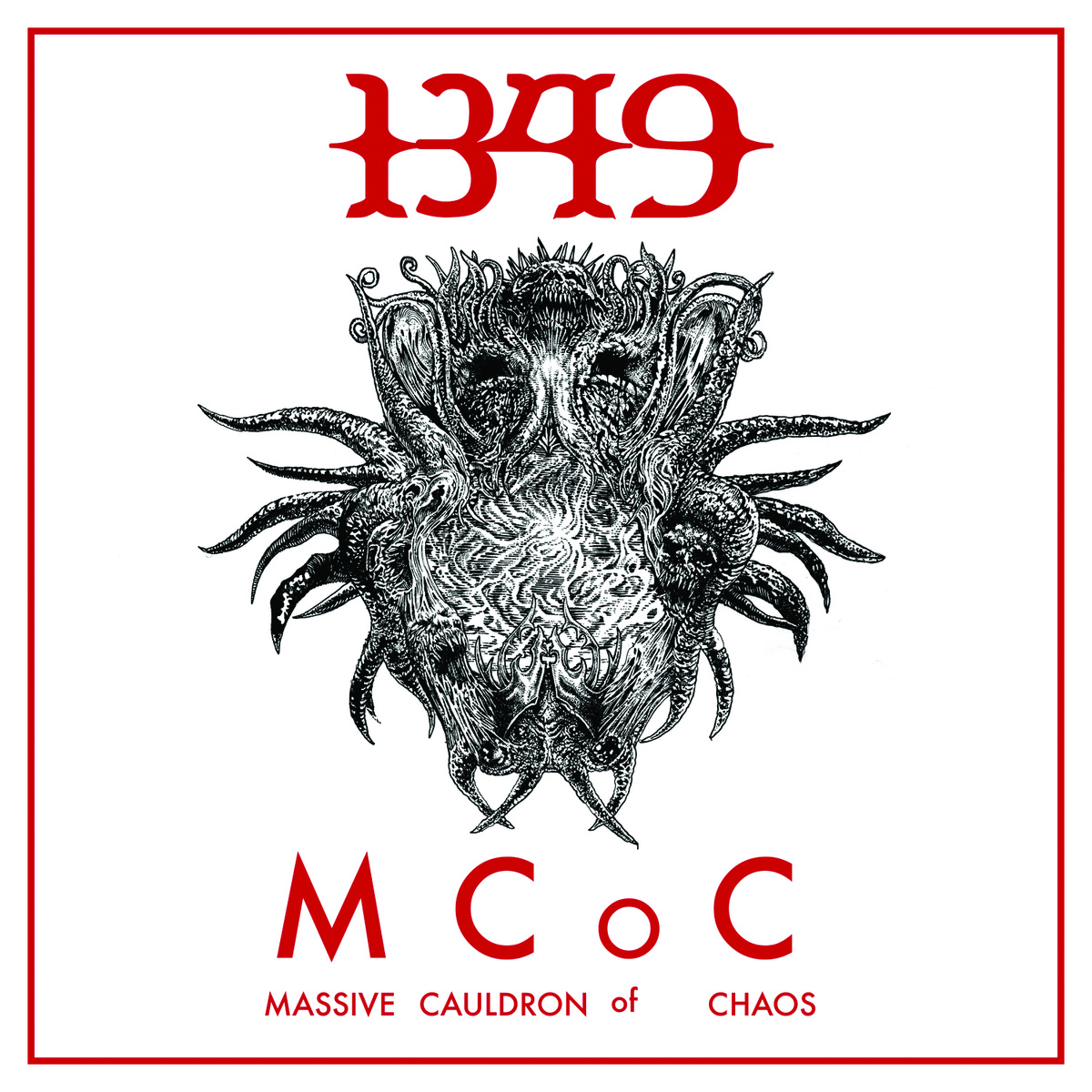 MB: At what point did you stop caring about what people thought about your music?
MB: At what point did you stop caring about what people thought about your music?
Seidemann: [Laughs] Well, I started playing black metal when I was 14 or 15 years old, and no one in the small village in Norway I lived in knew what I was doing, so I stopped caring right then. I wanted so badly to make this music, but there was nobody else around that knew what it was, so I was in the basement by myself making cassettes… that’s very “trve” and “kvlt” probably [laughs]. But that’s really when I stopped, because I knew that if I wanted to go anywhere with this I couldn’t t care, I couldn’t t sit there and say “Oh no, User653blahblahblah said I suck!” Fuck that guy.
Back in 1997 or so, when 1349 started, we saw all of that stuff going on the internet, and we decided that we could either sit there at the computer and be part of the problem, or go to the rehearsal room and be part of the solution. That’s the bottom line; you can be part of the problem and whine about shit on the internet, or you can go to the rehearsal room and do your best to be part of the solution. For me 1349 is part of the solution, it is black metal the way I want to play black metal,
MB: 1349 is now getting in the beer business, with 2 beers coming out soon. Were you inspired by the very successful Trooper beer by Iron Maiden?
Seidemann: Not at all; we met with Todd Haug from Surly Brewery back in 2010, and discussed making a beer together back then. I know metal and beer go together pretty well; plus, we’ve always been beer geeks, so making our own beer has always been one of our dream. We’ve been working on this for 4 years.
MB: And you had an active part in the tasting and recipe?
Seidemann: Yeah, Frost made the recipe, and we all pitched and said “add a little of this” or “add a little of that”, and some crazy stuff.
MB: So, as a beer geek, what is the best beer around?
Seidemann: For what occasion? [Laughs] There are so many good beers. My favorite IPA at the moment is Vestkyst from Kinn, a Norwegian brewery. My favorite kriek is from Lindeman’s in Belgium, I think. My favorite stout, or dark beer, is the coming 1349 beer, of course. There’s so much good shit out there, I’m not the preacher, not even the teacher, so I say go out there and sample for yourself!
MB: Thank you very much for your time.
Seidemann: You’re welcome, see you next time!
